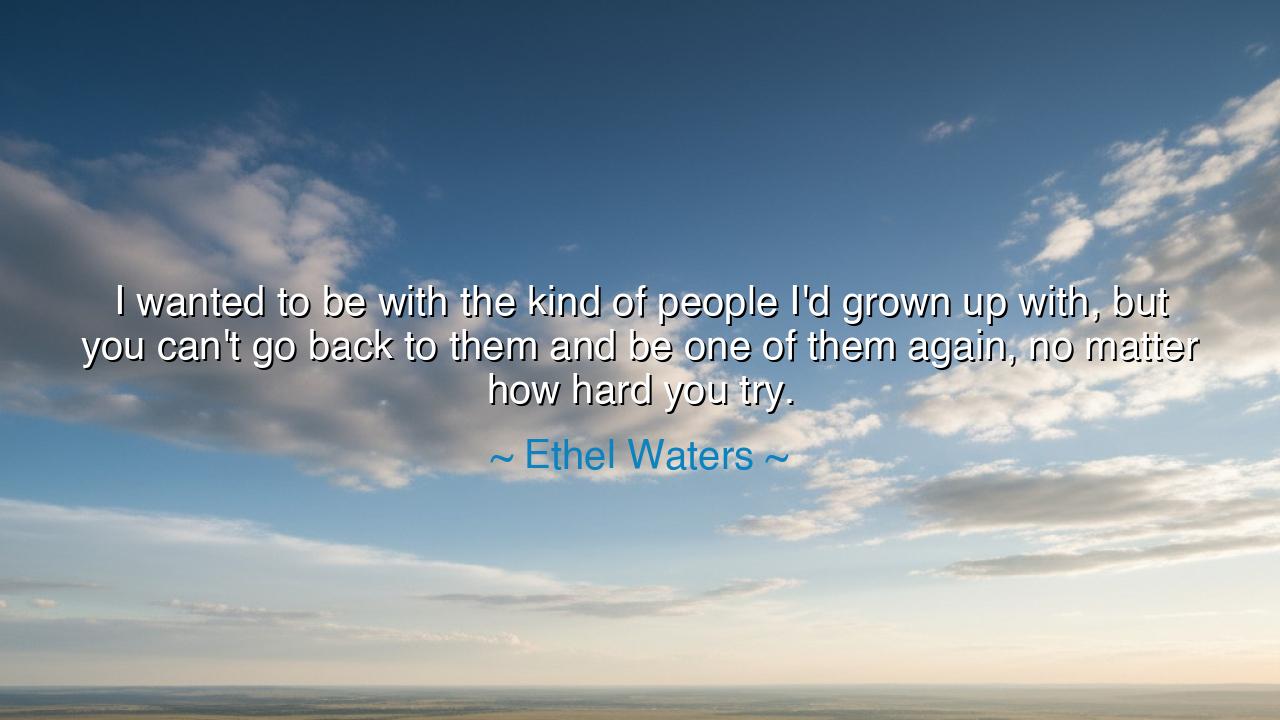
I wanted to be with the kind of people I'd grown up with, but
I wanted to be with the kind of people I'd grown up with, but you can't go back to them and be one of them again, no matter how hard you try.






Hearken, O children of the ages, to the reflective words of Ethel Waters, who speaks of the bittersweet truth of memory and transformation: “I wanted to be with the kind of people I’d grown up with, but you can’t go back to them and be one of them again, no matter how hard you try.” In her insight, we perceive an eternal truth: time moves unceasingly, and the currents of life carry us forward. The bonds of youth, while cherished, cannot be restored in their original form, for both the self and the world are forever altered by experience.
Since antiquity, sages and storytellers have observed this law of change. In the epics of Homer, Odysseus longs to return to Ithaca, to reclaim the life he left behind. Yet even as he approaches his home, he discovers that the passage of years has reshaped both the land and its people, and that he cannot inhabit his past self. Waters’ reflection echoes this timeless principle: though the heart may yearn for the familiar of youth, it is transformed by the journey, and the past exists only in memory, not in possibility.
Consider the story of Abraham Lincoln, who rose from humble beginnings in a frontier community to the presidency of a divided nation. Though he remembered the simplicity of his early life and the companionship of those who shared it, he could not return to it unchanged. Waters’ words capture this universal experience: the innocence, identity, and belonging of childhood are irrevocably shaped by time, and one must reconcile memory with present reality.
Her reflection also illuminates the painful beauty of growth. To move forward is to gain knowledge, experience, and selfhood, yet it comes with the recognition that some doors cannot be reopened. The yearning to return is natural, a testimony to love, attachment, and nostalgia. Yet true wisdom lies in acknowledging that the self is forever changed, and that new bonds and new understanding must be cultivated to honor the passage of life.
The lesson is profound: cherish the memory of those with whom you grew, but recognize that return is impossible in its purest form. The people of your past, like yourself, have changed; the places are altered by time. To dwell too long in longing for what once was is to ignore the opportunities and relationships of the present. Waters teaches that acceptance and forward vision are essential to peace and fulfillment.
Practical guidance emerges from this reflection. Reflect upon your past with gratitude, honor the bonds that shaped you, and preserve their lessons in memory and practice. Engage fully with the people and opportunities of the present, understanding that new experiences, though unfamiliar, can cultivate belonging, growth, and connection. Reconciliation with the past requires both remembrance and forward motion.
Ethel Waters’ words also remind us of the universality of human transformation. Every individual who journeys through life experiences the tension between memory and change, longing and reality. By embracing both, one cultivates resilience, gratitude, and the capacity to find new communities, even as one honors the ones left behind.
Thus, heed the eternal teaching of Ethel Waters: the people and experiences of youth are treasures to remember, but they cannot be relived. Accept the impossibility of returning unchanged, cherish memory, and embrace the present with openness and courage. In doing so, one honors the continuity of life, the lessons of the past, and the enduring potential of the self to belong, to grow, and to love anew.






AAdministratorAdministrator
Welcome, honored guests. Please leave a comment, we will respond soon